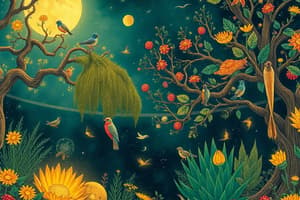Podcast
Questions and Answers
What travels through a food chain or web?
What travels through a food chain or web?
Energy
What is the ultimate energy source for all life on Earth?
What is the ultimate energy source for all life on Earth?
Sun
Food chains start with what?
Food chains start with what?
Primary producer
The 1st organism in a food chain must always be what type of organism?
The 1st organism in a food chain must always be what type of organism?
Name 2 food-making processes.
Name 2 food-making processes.
Where do chemosynthetic bacteria get their energy?
Where do chemosynthetic bacteria get their energy?
Define herbivore.
Define herbivore.
Herbivores are also called _________________.
Herbivores are also called _________________.
What are animals called that feed on herbivores?
What are animals called that feed on herbivores?
Secondary consumers are eaten by larger _____________.
Secondary consumers are eaten by larger _____________.
_____________ consumers eat secondary consumers.
_____________ consumers eat secondary consumers.
Make a food chain with a producer and 3 consumers.
Make a food chain with a producer and 3 consumers.
What is used to indicate the flow of energy in a food chain or web?
What is used to indicate the flow of energy in a food chain or web?
What happens to energy as we move from step to step in a chain or web?
What happens to energy as we move from step to step in a chain or web?
Define food web.
Define food web.
What is meant by trophic levels?
What is meant by trophic levels?
Define autotroph.
Define autotroph.
The 1st trophic level consists of _____________ consumers called _____________.
The 1st trophic level consists of _____________ consumers called _____________.
Name the 2nd trophic level (both names).
Name the 2nd trophic level (both names).
Secondary consumers may be _____________ eating meat or __________ that eat both plants and animals.
Secondary consumers may be _____________ eating meat or __________ that eat both plants and animals.
What is the 3rd trophic level called?
What is the 3rd trophic level called?
What is the 4th trophic level called?
What is the 4th trophic level called?
At the 5th trophic level would be _________ consumers that eat __________ consumers.
At the 5th trophic level would be _________ consumers that eat __________ consumers.
Give an example of 3 detritivores. On what do they feed?
Give an example of 3 detritivores. On what do they feed?
What organism feeds on dead plants and animals and helps recycle them?
What organism feeds on dead plants and animals and helps recycle them?
Both __________ and ____________ act as decomposers.
Both __________ and ____________ act as decomposers.
Can an organism fill more than one trophic level?
Can an organism fill more than one trophic level?
In food chains and webs, what trophic level must you have more of than others?
In food chains and webs, what trophic level must you have more of than others?
Each trophic level has how much LESS energy?
Each trophic level has how much LESS energy?
What may happen if a species goes extinct?
What may happen if a species goes extinct?
What do the arrows in a food chain represent?
What do the arrows in a food chain represent?
A food chain starts with an _________________ source?
A food chain starts with an _________________ source?
Organisms that make their own food are called _________________ or ___________________.
Organisms that make their own food are called _________________ or ___________________.
Organisms that eat plants are called _________________ or ___________________.
Organisms that eat plants are called _________________ or ___________________.
An animal with no natural enemies is a ________________.
An animal with no natural enemies is a ________________.
Flashcards are hidden until you start studying
Study Notes
Energy Flow in Food Chains and Webs
- Energy travels through food chains and webs, essential for sustaining life.
- The ultimate energy source for all life on Earth is the Sun.
Primary Producers and Autotrophs
- Food chains begin with primary producers, known as autotrophs.
- Autotrophs create their own food through processes like photosynthesis and chemosynthesis.
- Chemosynthetic bacteria derive energy from boiling hot deep-sea vents.
Consumer Identification
- Herbivores, or primary consumers, are organisms that consume producers.
- Secondary consumers feed on herbivores, while tertiary consumers eat secondary consumers.
- Quaternary consumers exist at the top of the food chain with no natural enemies.
Energy Transfer and Loss
- Arrows in food chains represent the flow of energy.
- As energy moves through trophic levels, approximately 90% is lost at each step.
Trophic Levels
- The first trophic level consists of primary consumers (autotrophs).
- The second trophic level consists of primary consumers (herbivores).
- Secondary consumers can be carnivores or omnivores, while tertiary consumers follow them.
- The fifth trophic level is made up of quaternary consumers that eat tertiary consumers.
Decomposers and Nutrient Recycling
- Decomposers, such as bacteria and fungi, recycle nutrients by feeding on dead plants and animals.
- Detrivores like vultures, worms, and crabs also play a key role in breaking down organic matter.
Species Interactions and Chain Effects
- An organism can occupy multiple trophic levels; for example, bears can be both omnivores and predators.
- Maintaining a higher number of autotrophs than heterotrophs is crucial for ecosystem balance.
- If a species goes extinct, it can impact the entire food chain, leading to unpredictable consequences.
Summary of Key Concepts
- Each trophic level represents a different position in the food web, affecting energy availability and species interactions.
- Understanding food chains and webs is vital for grasping ecological relationships and the significance of energy flow in ecosystems.
Studying That Suits You
Use AI to generate personalized quizzes and flashcards to suit your learning preferences.




